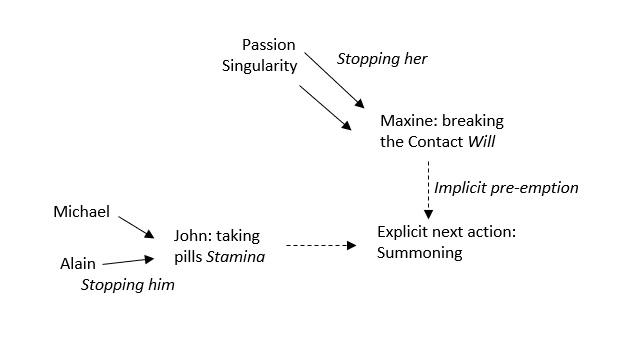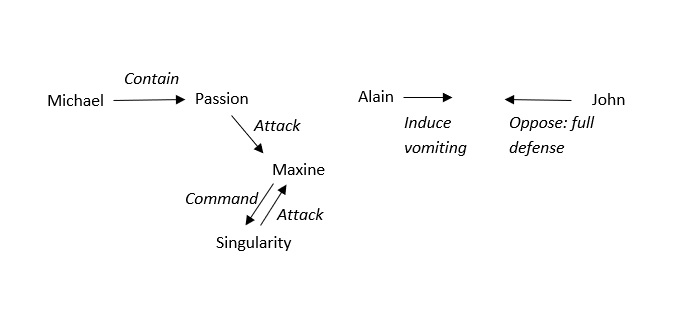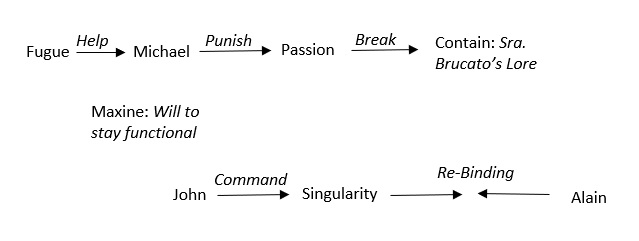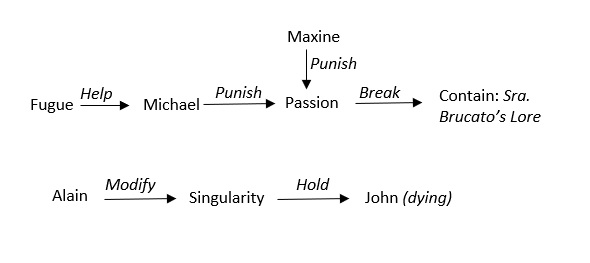
Kickers aren’t confined merely to their initiating events. They’re what those events become, measured in human costs. Alain found his bid for tenure challenged by his mentor’s bitterness. Maxine’s band landed a sweet record contract. Michael’s criminal enterprises brought danger to his family for the first time. Nothing anyone armed with demonic forces couldn’t handle … except that this time, for each one, it was to be the turning point he or she never saw coming.
This session is composed of four rapid-fire rounds of conflict. I’ve diagrammed each one in the video, but I’ll reproduce them here for discussion.
Here’s where we started: John is initiating a Summoning ritual, beginning by downing all the pills in his vial of his heart medicine, which is to say, poisoning himself.

What happens? In each, the less-likely occurs. John succeeds; neither Michael and Alain can stop him. Maxine actually breaks the Contact despite the efforts of two monstrous demons.
Then, well, as the demons attack Maxine and Michael gets in on trying to settle them down, Alain keeps trying to save John

Suffice to say that Alain fails, Michael succeeds, and Maxine gets hit hard. Next, Michael has managed to recover Fugue’s loyalty and tries to reduce Passion’s power, while John and Alain wrestle for control over Singularity; meanwhile Maxine struggles to stay in command of her own faculties despite severe damage.

Passion weakens the Contain, un-Punished, John regains control of Singularity, and Maxine stays conscious. This is a big deal because she’s the only one who can Punish Passion without a roll. Which she then goes on to do, as Michael tries to continue as well, while Alain uses Singularity to try to save John’s life as the poison kicks in.

As it happens, Maxine does knock Passion down via her free Punish, and then – crucially – comforts the demon and feeds it its Need. Alain manages to stabilize John so he doesn’t die (not then and there, anyway).
As an exercise, consider how it would all have looked very different if during the first round, the demons had prevented Maxine from dropping the Contact, thus making it possible for John to initiate the Summons in the second round. In that case, Singularity would have betrayed Alain to aid John, Binding or no Binding, and Passion would have tried to influence Maxine to aid in the Summons. Zac was already playing Michael as one hair away from shooting John, after all.
Are the Kickers done? No, not yet. We need to see the shake-outs and the human consequences in play.

4 responses to “The way we roll”
Hello,
Hello,
there isn't much I can add to what Ron wrote above. In the previous thread I got excited and a bit carried away, so I started talking about what happened in this session. You can read it, in better context, here:
http://adeptplay.com/comment/297#comment-297
There's a small correction to be made to what Ron wrote above: In the paragraph above the last diagram, it should read "Alain regains control of Singularity", not John. This may prove confusing to a reader.
Almost the entire session was resolving the actions in a single scene, and it was pretty intense. There's a bunch of loose points from Alain's Kicker that need to be wraped up, as Ron pointed out, mainly about Helen and John, and although Kelly isn't really Kicker-related I still feel it needs some resolution or at least some kind of attention in play, even if there's no actual "closure". I'm not sure, regarding the other players and their Kickers, how much still needs to be seen to. But I have a feeling that things are coming to an end for this Sorcerer game, which saddens me a bit.
Kickers coming to an end is
Kickers coming to an end is only a piece of play, fortunately. It can be the end of play for a character, or not. Back in 2000-2001, the idea that you could retire your character and pick up another either made-up new or from existing ones, was not as easily-processed as it is now. But some time around 2005 or so, I realized that it made perfect sense for the game.
On the other hand, in practice, it's true that once the various Kickers have played-out their implications (that's important, it's not the starting imagery/content that matters for resolution), people tend to say, "all right, we played Sorcerer," and call it the end. Which is fine too, although I've noticed people may not grasp the character-change mechanics which kick in at that point. They're enjoyable enough that I| try to remember to have people use them even if it's the end for that character or for that game.
Yep, I’m aware of that , my
Yep, I'm aware of that , my comment was specifically related to this particular game we're playing.
, my comment was specifically related to this particular game we're playing.
It's nevertheless an interesting point to discuss. Your character can have it's stat(s) modified to reflect some meaningful change after the Kicker is solved and that particular game or "story arc", if you will, comes to an end. But you can continue to play that character later for a different game, with a new Kicker (and I think in some setups you could probably do it even without a Kicker, under certain conditions. This is an interesting topic of discussion per se, especially for S&S (Sorcerer & Sword)). This seems especially useful for S&S, since it supports well the self-contained nature of episodic play, which you talk at length in that supplement. This is actually something that I was enjoying doing regularly with other fantasy games long before reading S&S: come up with some cool setups, play that out until it felt the game came to it's natural conclusion. Then just come up with some other setup, like diffent place, different city, different situation, with a combination of new and recurrent characters, etc, and play that out. Rinse and repeat whenever you felt like playing that game again, no need for a year-long commitment. It was more satisfying, in general, than a priori deciding that the game would be a massive, continuous "campaign", especially most of those campaigns fizzled out long before comming anywhere near the end.
Aside from the more
Aside from the more specialized case of Sorcerer and Sword, I've learned that one feature of the change/improvement mechanism is much more important than I'd realized originally. You can change any or all of the character's descriptors as you please.
That turns out to be a big deal, not only for ongoing play, but especially as a final look at the character prior to ending play, either for the group or just for him or her.
One example from play was a character who was almost entirely paralyzed, using a mobile and dangerous possessor demon. Her initial descriptors were Almost immobile (Stamina was 1), User/Manipulative, and Coven Member; the Price was psychological, can't remember exactly. After the first, very extensive Kicker resolution for her, the player redefined her as Athletic Regimen (Stamina is now 2), Self-Esteem, and Adept, and the new Price was "still recovering." So the character was still impaired and by no means strong, but no longer immobile and entirely fragile, and she was very much a changed person. Seeing her just for a moment in this new way, just before ending play, was extremely important to our overall experience.